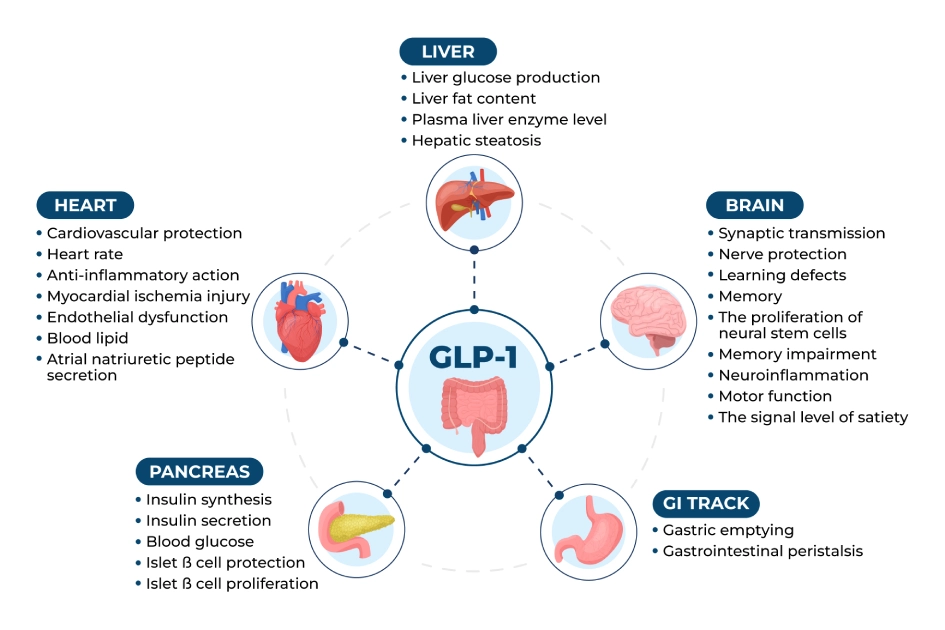GLP-1 (Glucagon-Like Peptide-1) medications have garnered widespread attention for their remarkable effectiveness in promoting weight loss. However, their benefits extend far beyond shedding pounds. These medications play a pivotal role in improving overall metabolic health and reducing cardiovascular risks, making them a game-changing option for individuals struggling with obesity, type 2 diabetes, and related health conditions. By addressing the root causes of metabolic dysfunction, GLP-1 medications offer a holistic approach to better health.
In this article, we explore how GLP-1 medications go beyond weight loss to support long-term metabolic and cardiovascular well-being.
What Are GLP-1 Medications?
GLP-1 is a hormone naturally produced in the intestines in response to food intake. It helps regulate blood sugar levels, slows gastric emptying, and sends satiety signals to the brain to control appetite. GLP-1 receptor agonists, such as Semaglutide (Wegovy, Ozempic) and Liraglutide (Saxenda), mimic the effects of this hormone, helping individuals manage their weight, control blood sugar, and improve their overall metabolic profile.
The Metabolic Benefits of GLP-1 Medications
1. Improved Insulin Sensitivity
One of the primary benefits of GLP-1 medications is their ability to enhance insulin sensitivity. By increasing the body’s response to insulin, these medications help prevent blood sugar spikes and crashes, which are common in individuals with insulin resistance or type 2 diabetes.
- How It Works: GLP-1 increases insulin secretion in a glucose-dependent manner, meaning insulin is released only when blood sugar levels are elevated.
- Impact: This regulation helps prevent hyperglycemia without causing dangerous drops in blood sugar (hypoglycemia).
For individuals with prediabetes or diabetes, this improved insulin sensitivity can prevent further progression of the disease and, in some cases, even lead to remission.
2. Blood Sugar Stabilization
GLP-1 receptor agonists slow down the rate at which food leaves the stomach (a process known as gastric emptying). This slows the release of glucose into the bloodstream, leading to smoother and more stable blood sugar levels after meals.
- Benefit: Prevents post-meal glucose spikes that can cause fatigue, sugar cravings, and long-term damage to blood vessels.
- Outcome: Individuals experience fewer cravings, more stable energy levels, and reduced reliance on short-acting insulin or oral hypoglycemic agents.
The Cardiovascular Benefits of GLP-1 Medications
1. Reduced Risk of Cardiovascular Events
Several large-scale clinical trials have demonstrated that GLP-1 medications reduce the risk of major cardiovascular events, such as heart attack, stroke, and cardiovascular-related death.
- Clinical Evidence:
- LEADER Trial (Liraglutide): Showed a 13% reduction in major adverse cardiovascular events.
- SUSTAIN-6 Trial (Semaglutide): Demonstrated a 26% reduction in cardiovascular events in individuals with type 2 diabetes.
These findings make GLP-1 medications particularly beneficial for individuals with obesity or diabetes who are also at high risk of cardiovascular disease.
2. Lower Blood Pressure and Cholesterol Levels
GLP-1 medications have been shown to reduce systolic blood pressure and improve lipid profiles by lowering LDL cholesterol and triglyceride levels.
- Mechanism: Weight loss alone can contribute to lower blood pressure, but GLP-1 medications also improve endothelial function, which enhances blood flow and reduces arterial stiffness.
- Result: A reduced burden on the cardiovascular system, decreasing the likelihood of heart failure and hypertension-related complications.
Impact on Inflammation and Liver Health
Chronic inflammation is a key contributor to metabolic disorders and cardiovascular disease. GLP-1 medications have demonstrated anti-inflammatory effects, which can help:
- Reduce Systemic Inflammation: Lower levels of inflammatory markers like C-reactive protein (CRP).
- Improve Liver Health: Prevent or reverse the progression of non-alcoholic fatty liver disease (NAFLD), a common condition in individuals with obesity or type 2 diabetes.
By targeting inflammation, GLP-1 medications support overall metabolic stability and reduce the risk of complications related to organ damage.
Comparison of GLP-1 Medications and Traditional Treatments
| Aspect | GLP-1 Medications | Traditional Weight Loss Methods |
|---|---|---|
| Appetite Control | Targets hunger hormones | Relies on willpower alone |
| Blood Sugar Control | Improves insulin sensitivity | May not address glucose spikes |
| Cardiovascular Benefits | Reduces major events (e.g., heart attack) | Minimal direct effect |
| Sustainability | Promotes gradual, lasting weight loss | Higher risk of weight regain |
Why GLP-1 Medications Are a Holistic Solution
1. Whole-Body Health
Unlike crash diets or unregulated supplements, GLP-1 medications address multiple aspects of metabolic health simultaneously—hunger regulation, insulin function, inflammation, and cardiovascular protection. This comprehensive approach makes them more effective than isolated weight loss methods.
2. Preventive Care
By improving blood sugar levels, lowering blood pressure, and promoting fat loss, GLP-1 receptor agonists can prevent the onset of serious health issues, such as heart disease, kidney failure, and stroke. This makes them an invaluable tool not just for weight loss, but for overall disease prevention.
Who Can Benefit from GLP-1 Medications?
GLP-1 medications are typically prescribed for:
- Individuals with a BMI of 30 or higher (classified as obese).
- Individuals with a BMI of 27 or higher who have weight-related comorbidities, such as hypertension or type 2 diabetes.
- Individuals at risk of cardiovascular disease who need to manage weight and improve metabolic markers.
These medications are particularly effective for people who have struggled with conventional weight loss methods and need a medical intervention to achieve meaningful health improvements.
FAQs About GLP-1 Medications and Metabolic Health
1. Can GLP-1 medications replace statins or blood pressure medications?
No, GLP-1 medications complement existing treatments but do not directly replace medications like statins or antihypertensives. However, significant weight loss and improved metabolic health may allow for a reduction in other medications over time.
2. Are there long-term risks associated with GLP-1 medications?
While GLP-1 medications are generally safe and well-tolerated, long-term use may increase the risk of mild gastrointestinal discomfort. Rare side effects, such as pancreatitis, are possible but uncommon.
3. How long should I stay on GLP-1 therapy?
The duration of therapy varies depending on individual goals and health conditions. Some individuals may use it long-term for maintenance, while others may taper off after reaching their target weight.
Conclusion
GLP-1 medications have redefined weight loss by offering more than just a slimmer waistline—they support long-term metabolic and cardiovascular health. By regulating appetite, improving insulin sensitivity, stabilizing blood sugar levels, and reducing the risk of heart disease, these medications address the root causes of obesity and related health issues. For individuals struggling with weight and metabolic imbalances, GLP-1 receptor agonists represent a holistic and sustainable path to better health.
While weight loss may be the initial motivation for many users, the broader health benefits of GLP-1 medications—improved energy, reduced inflammation, and a stronger heart—make them a breakthrough solution for lasting well-being. If you’re considering GLP-1 therapy, consult with your healthcare provider to explore how this innovative treatment can support your overall health journey.

